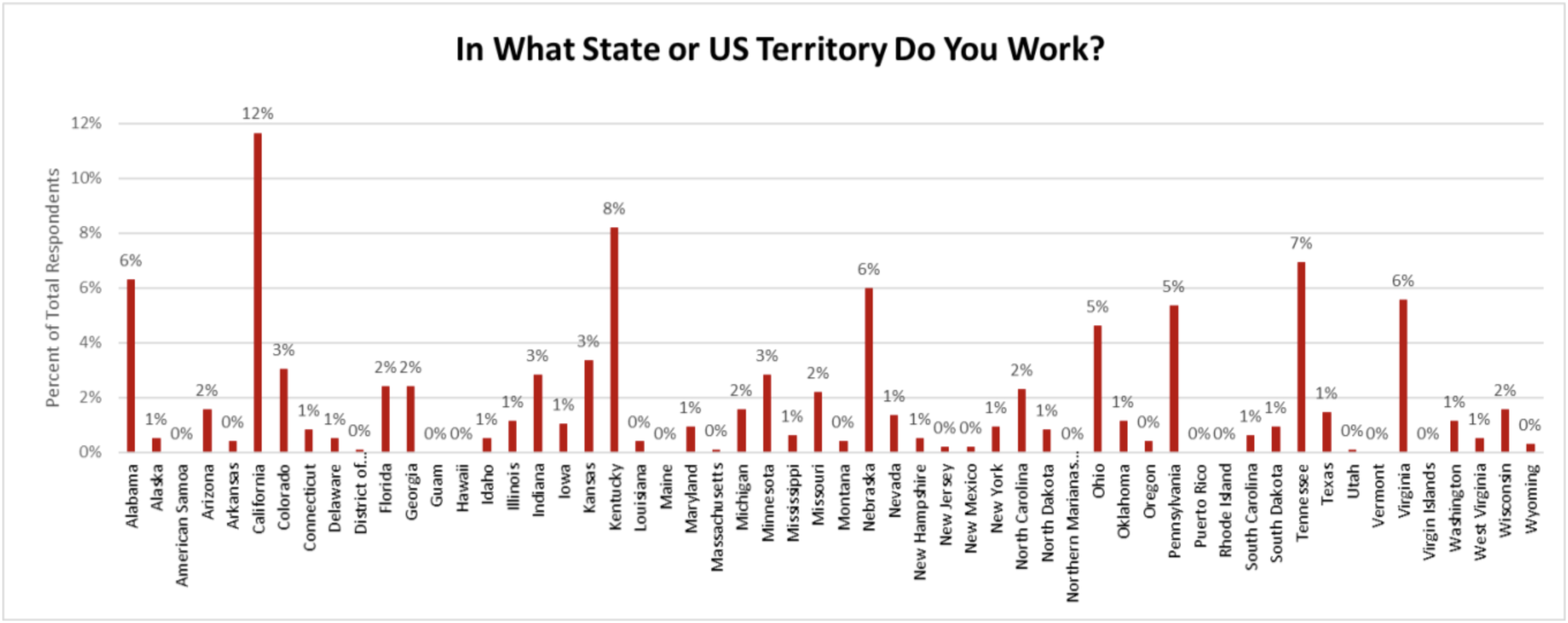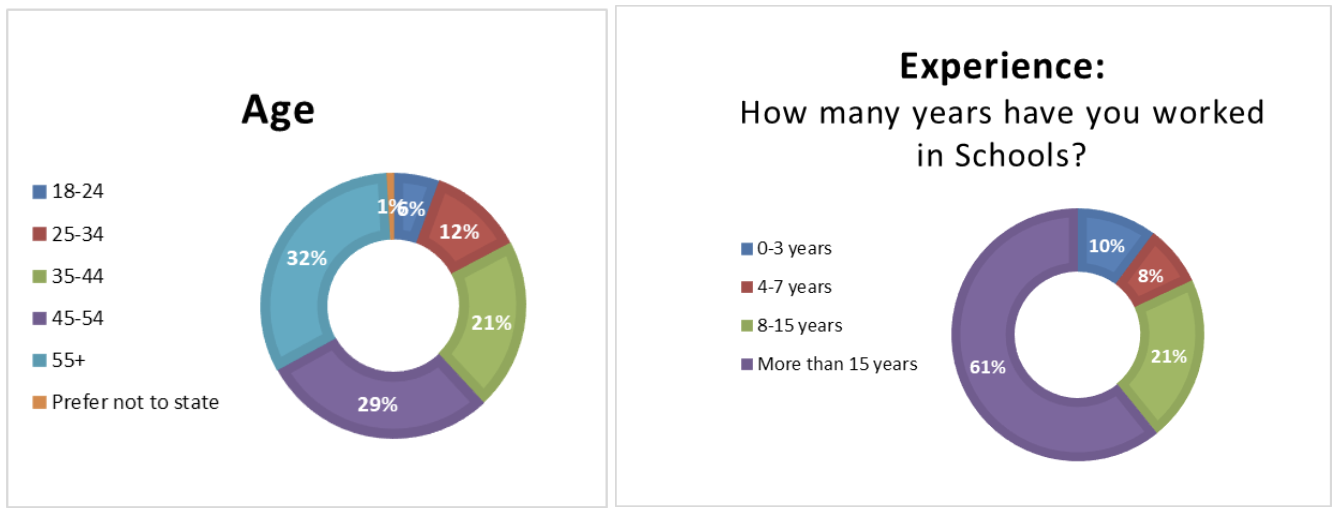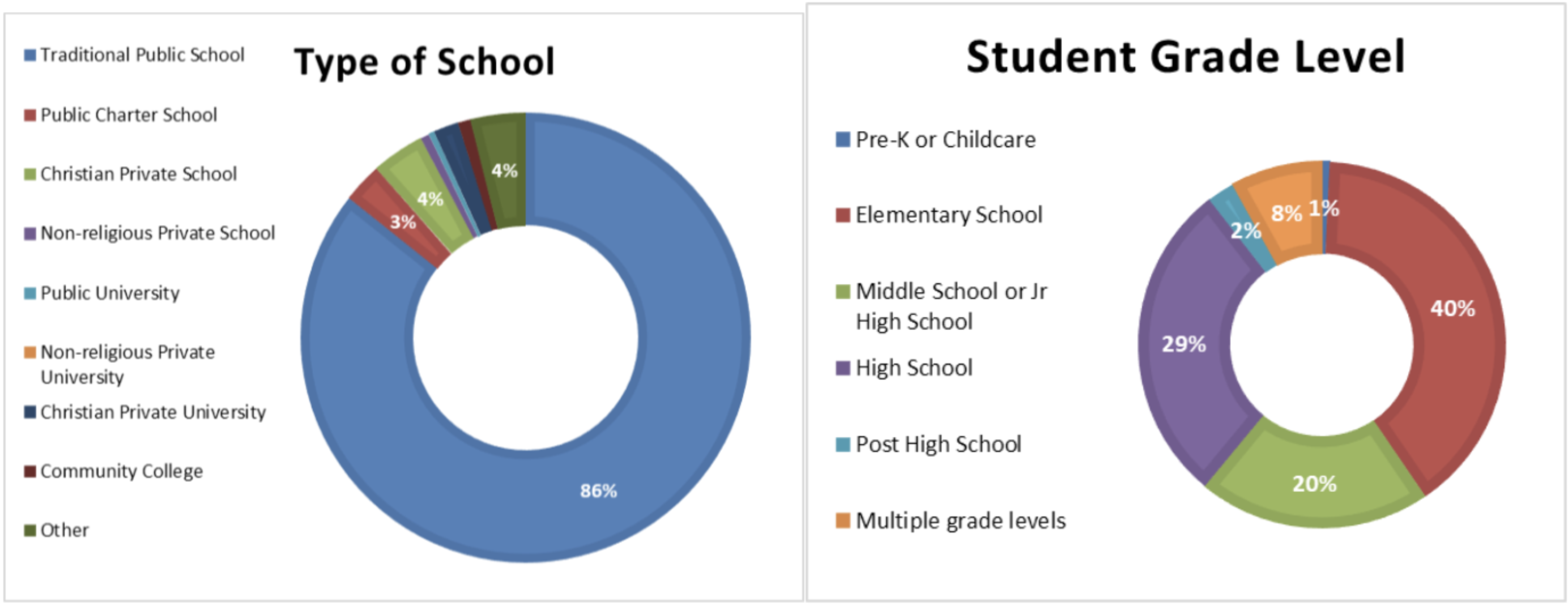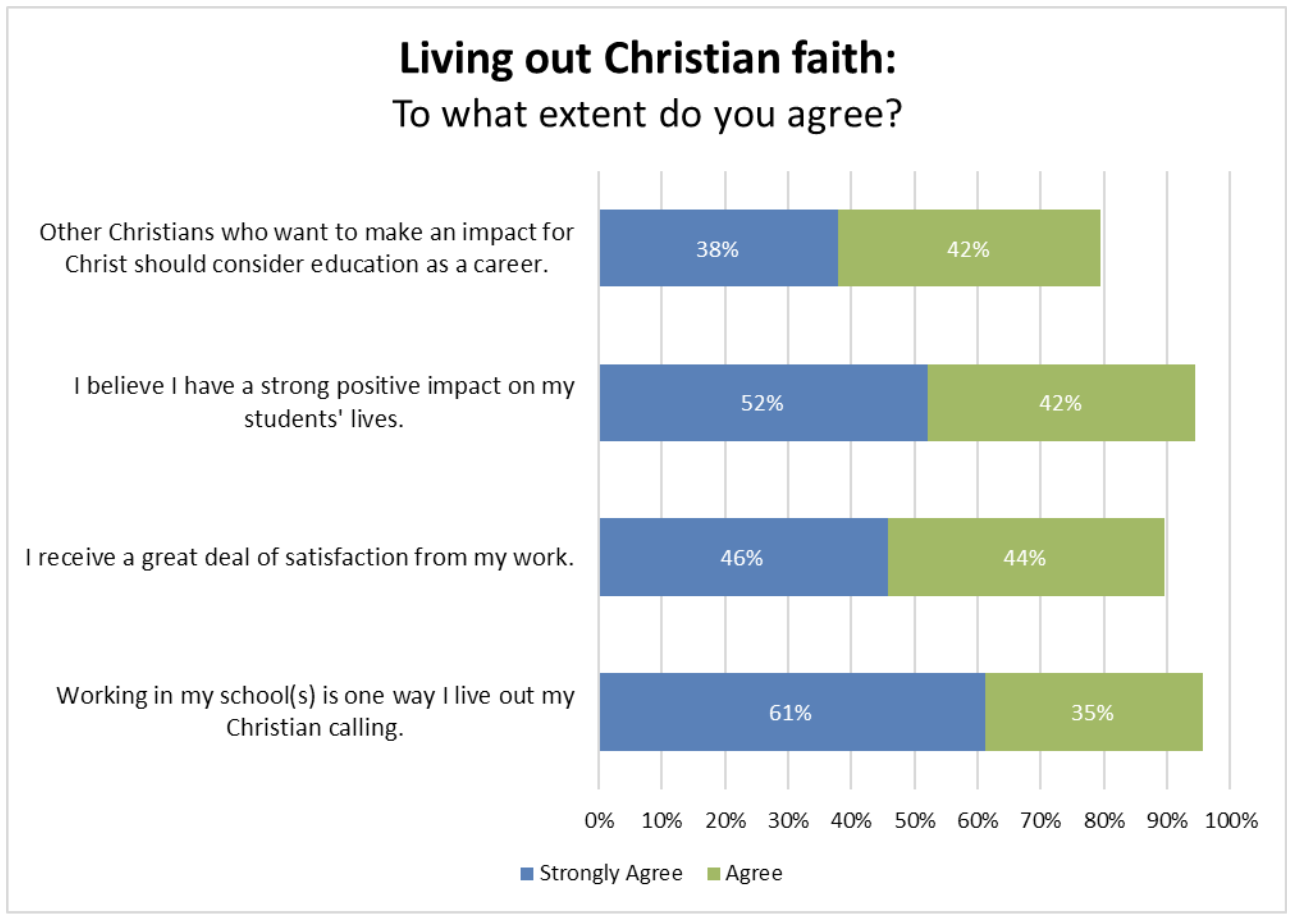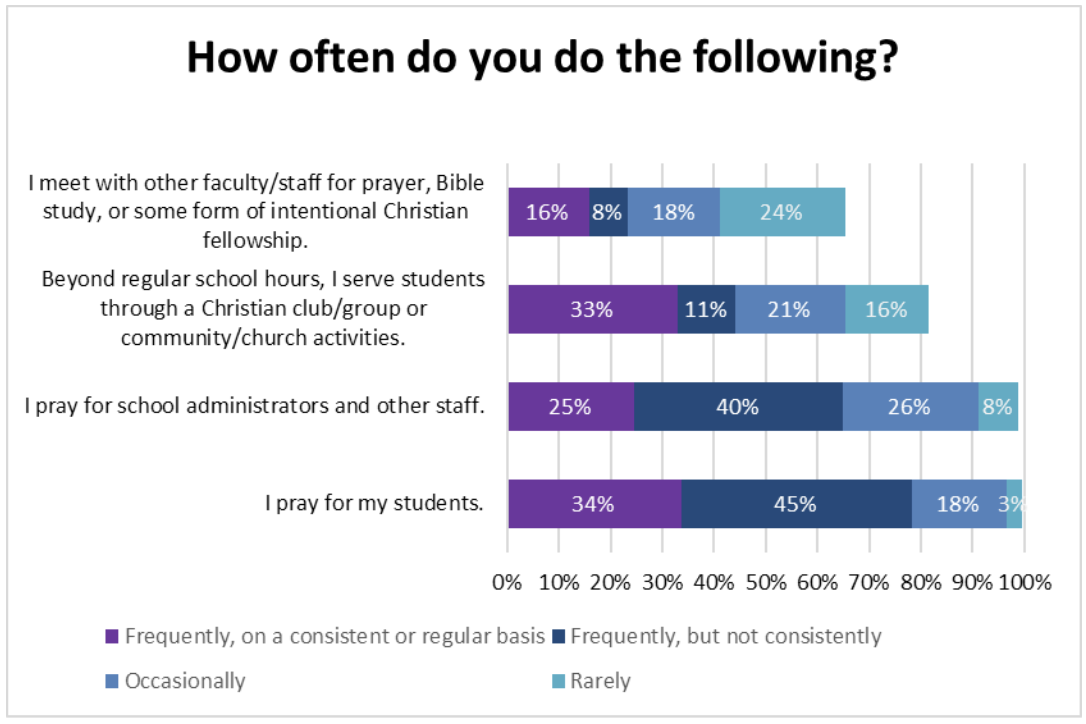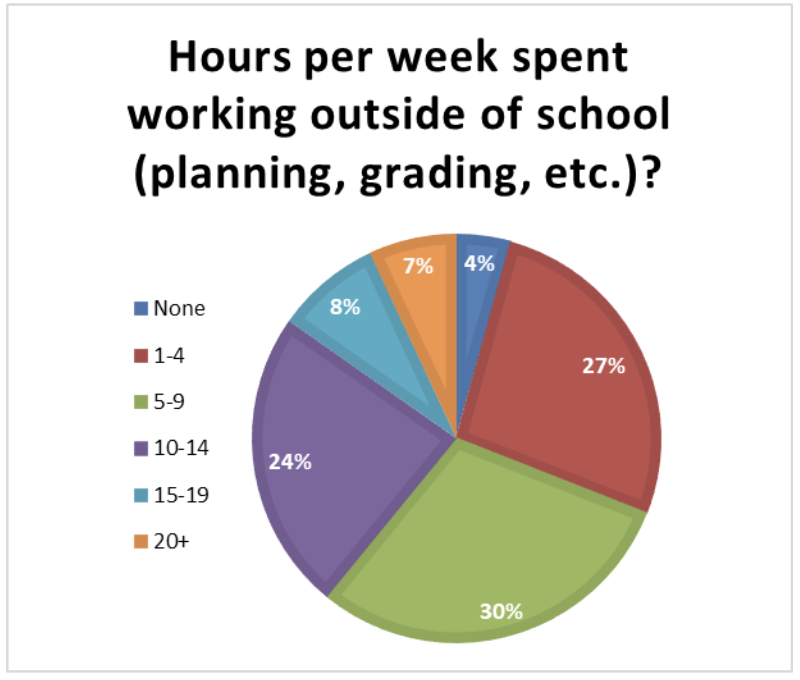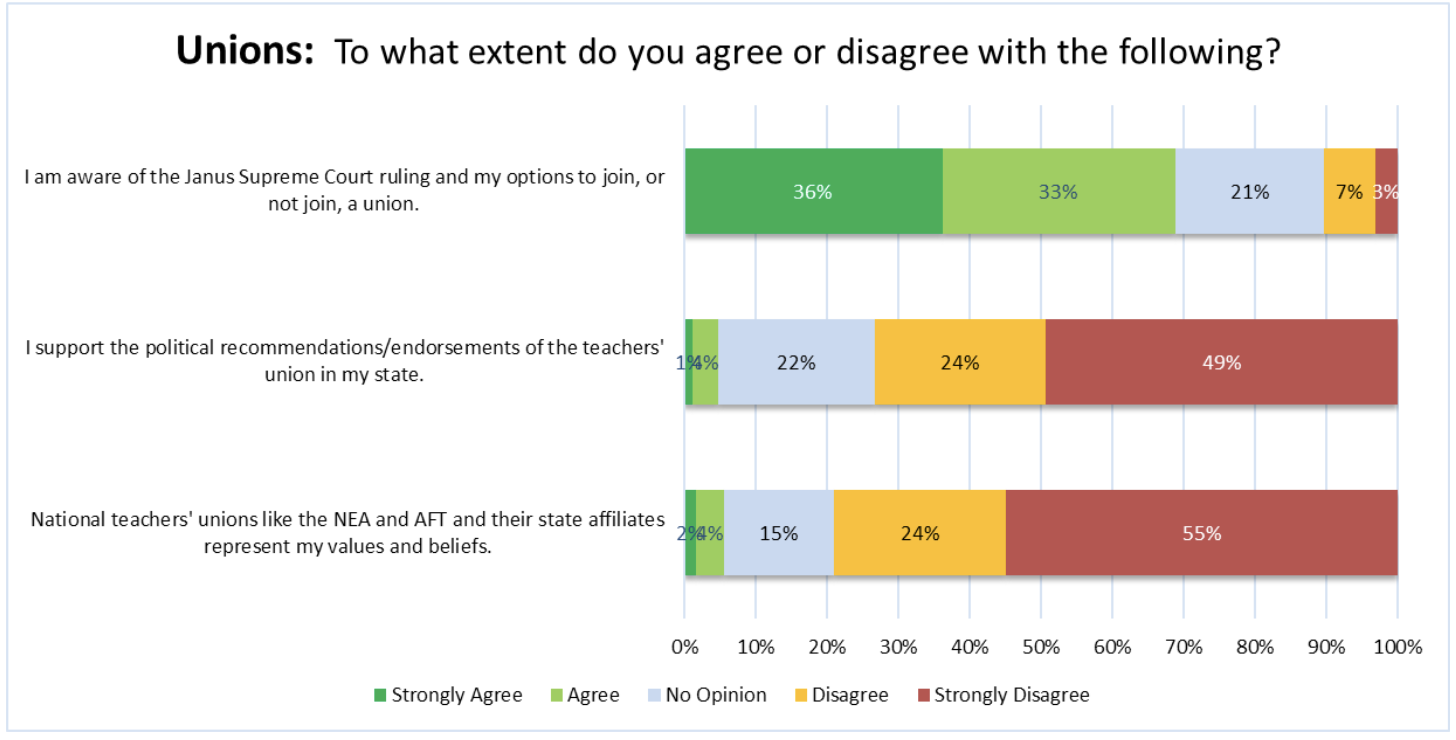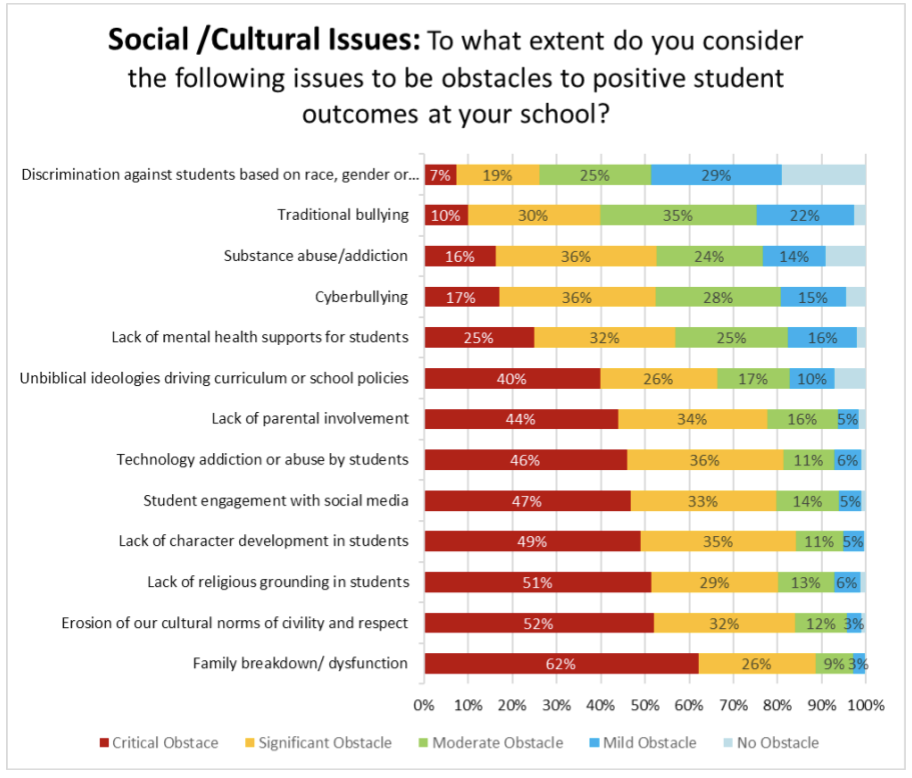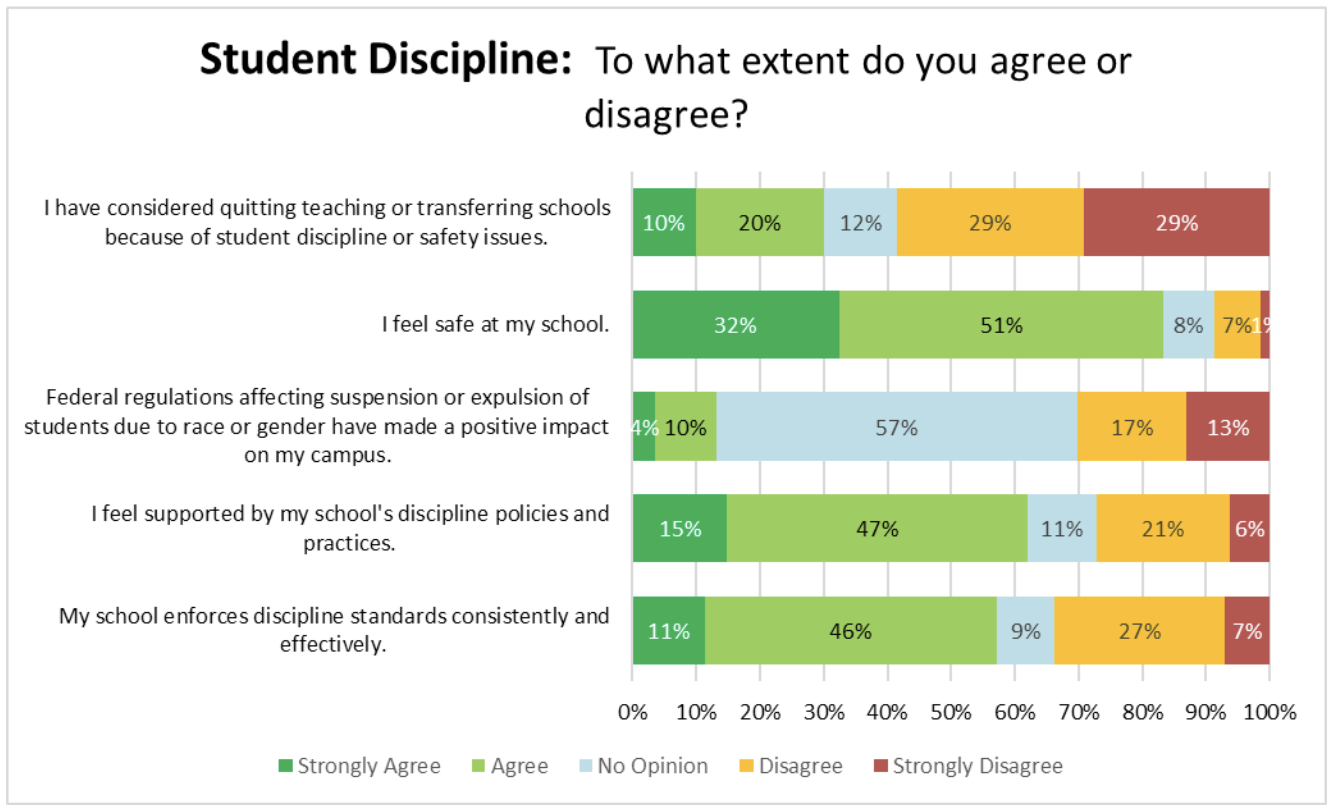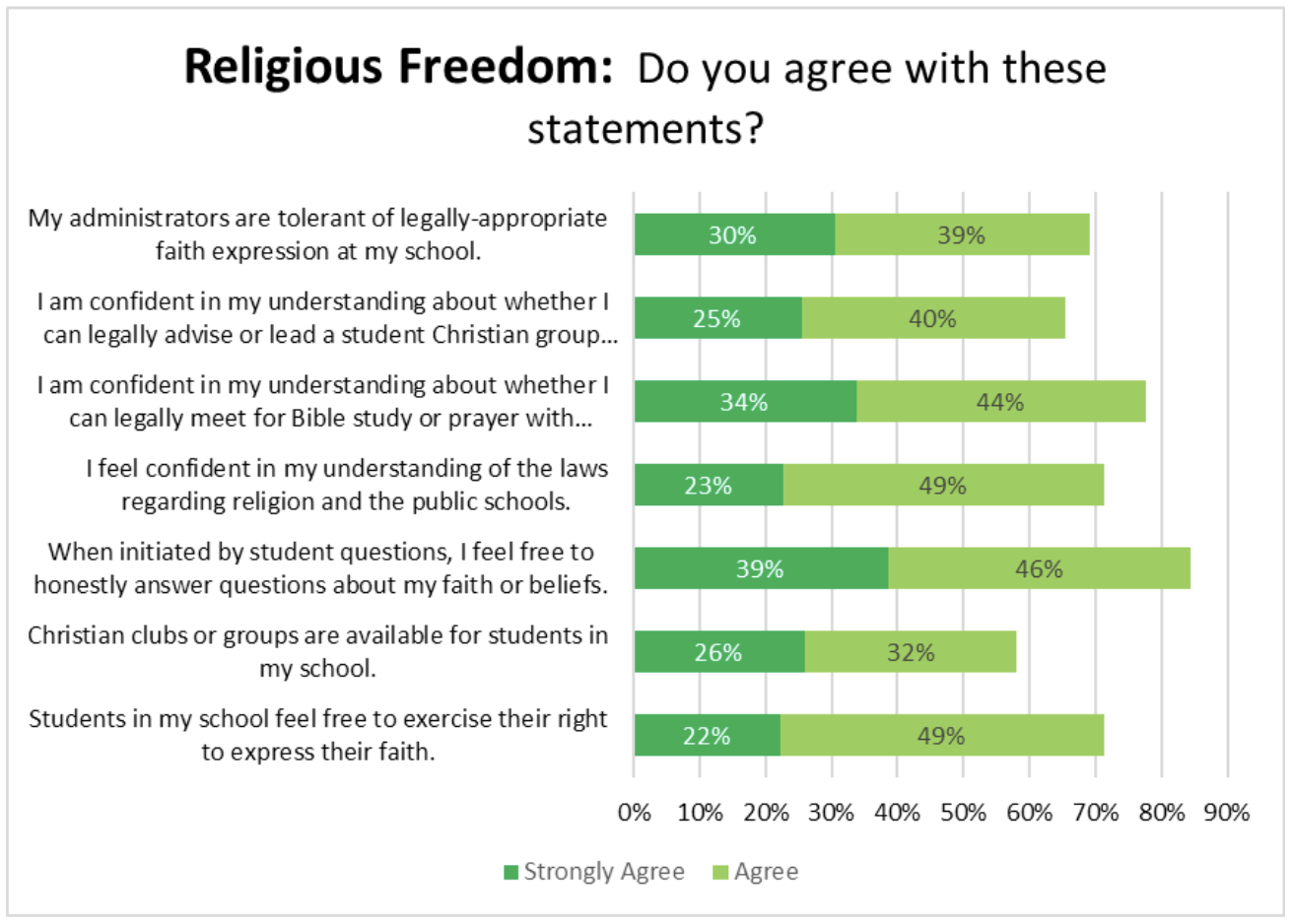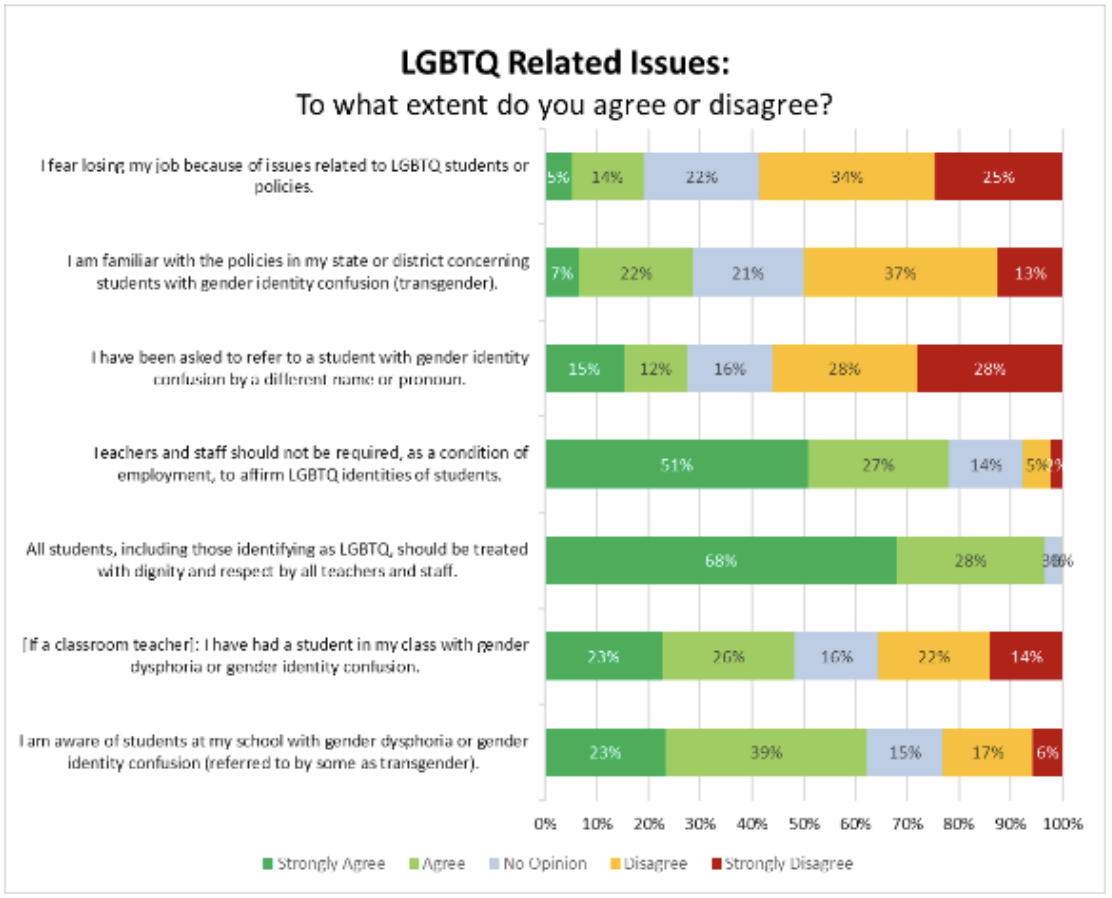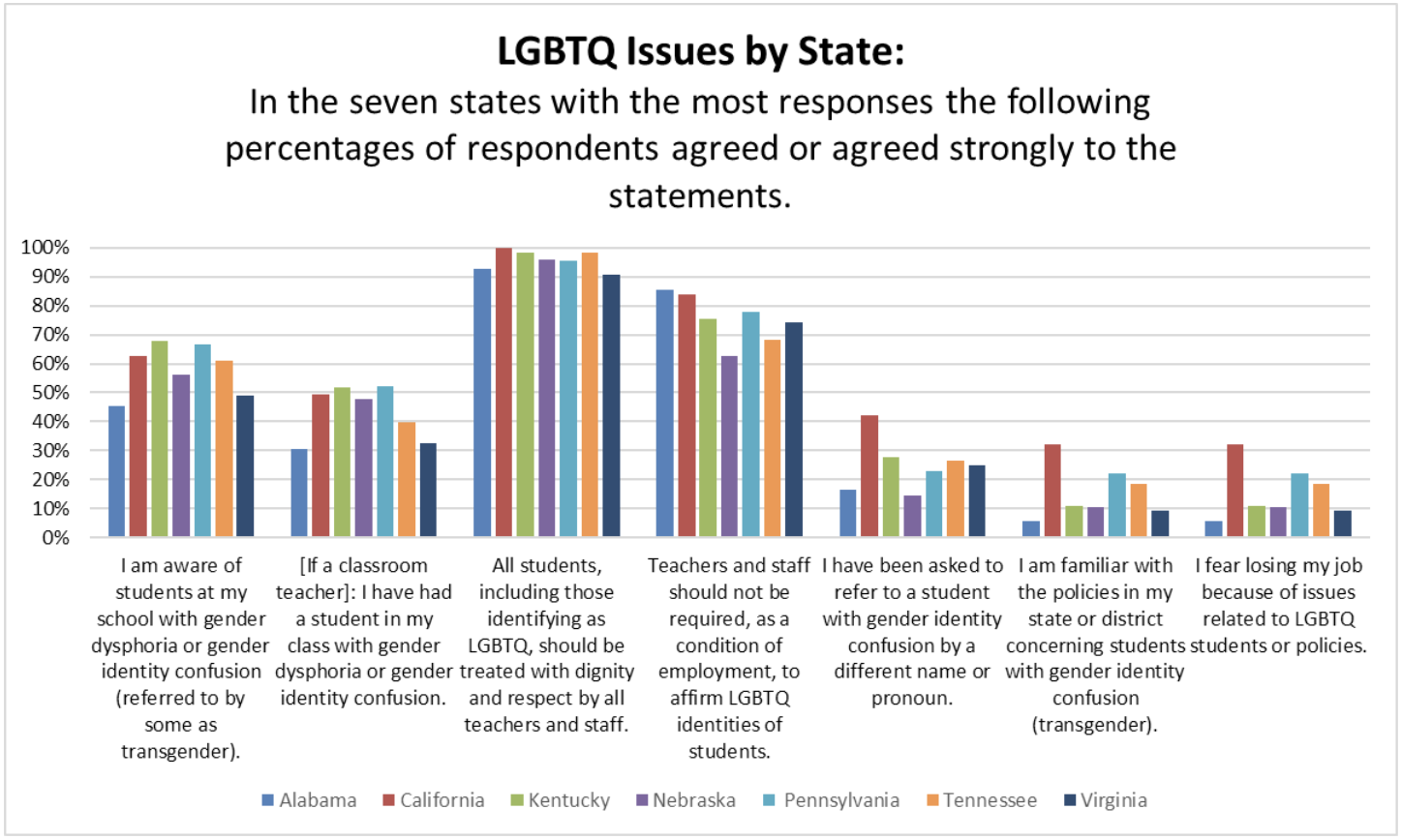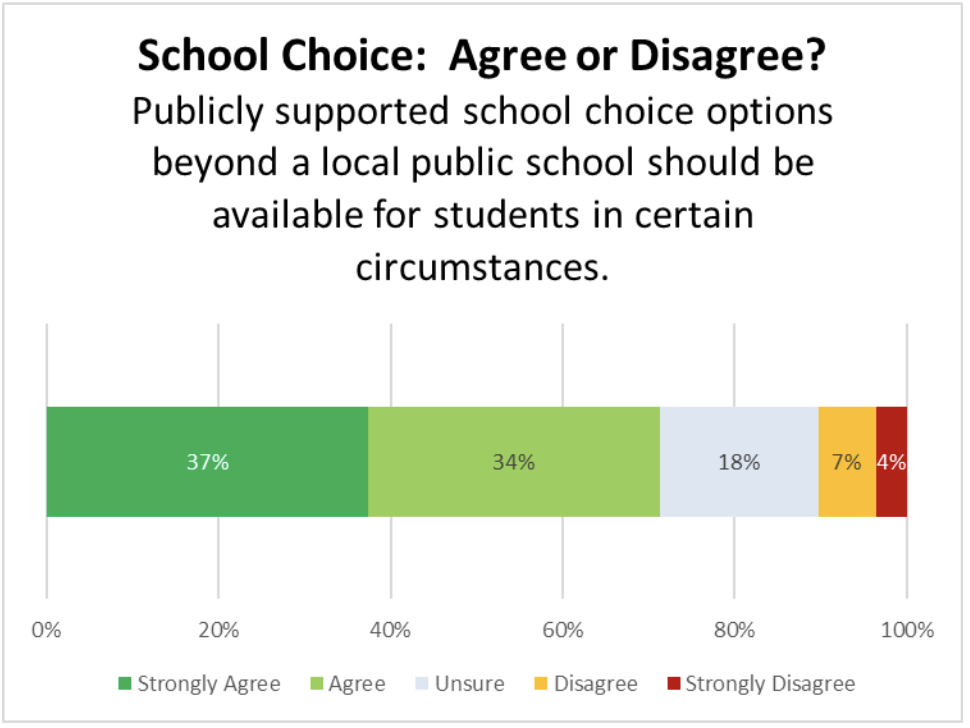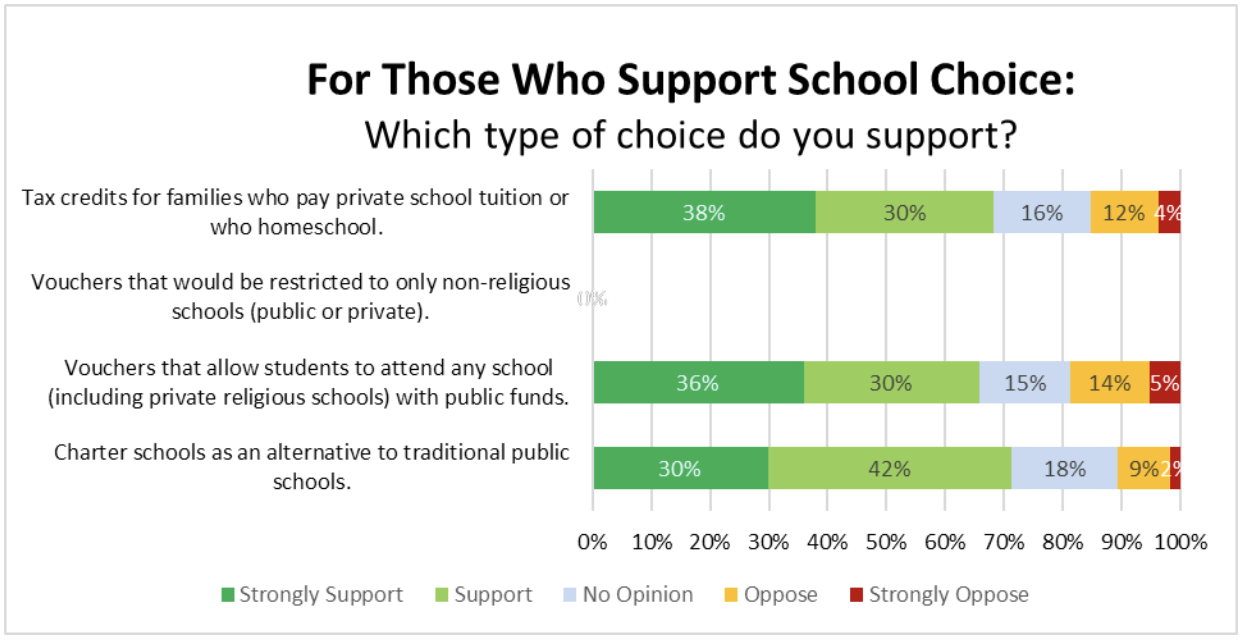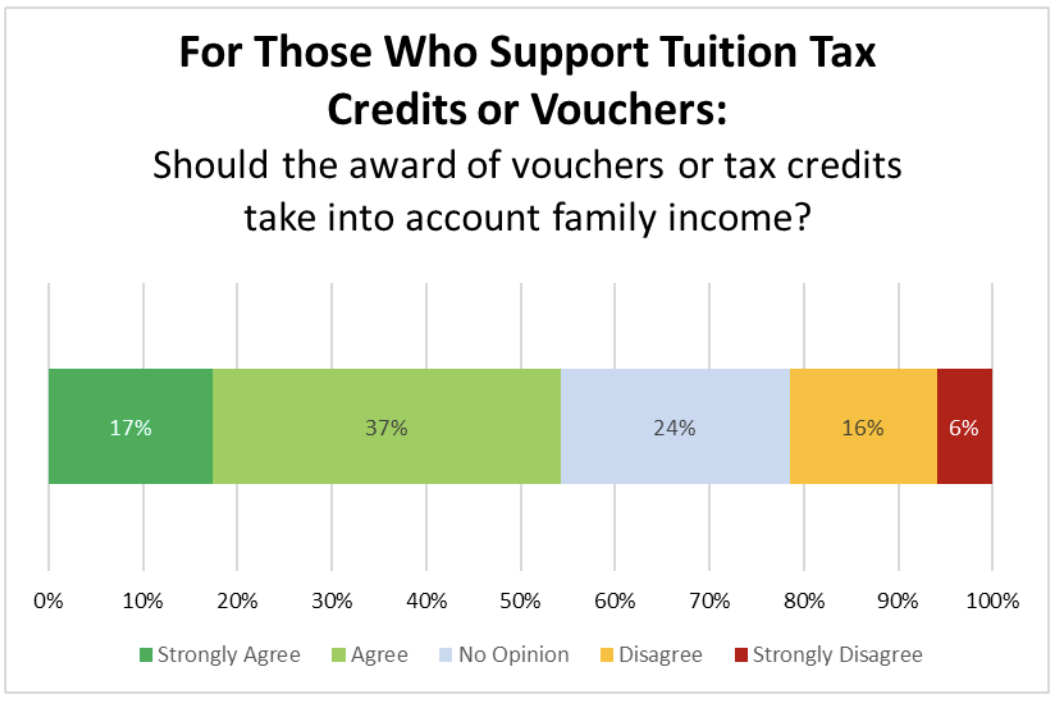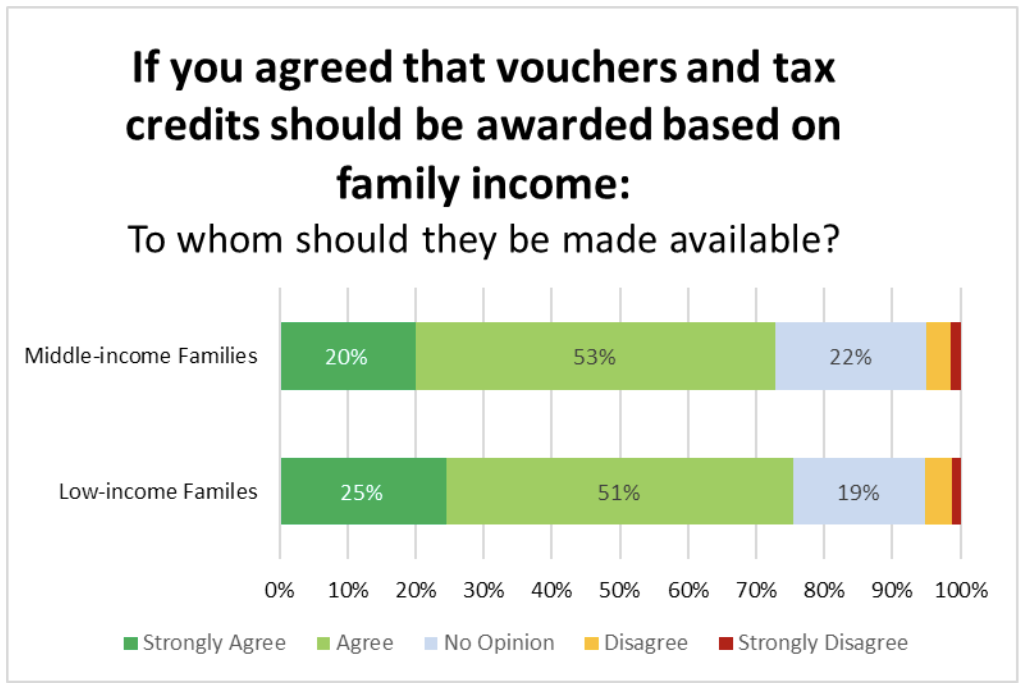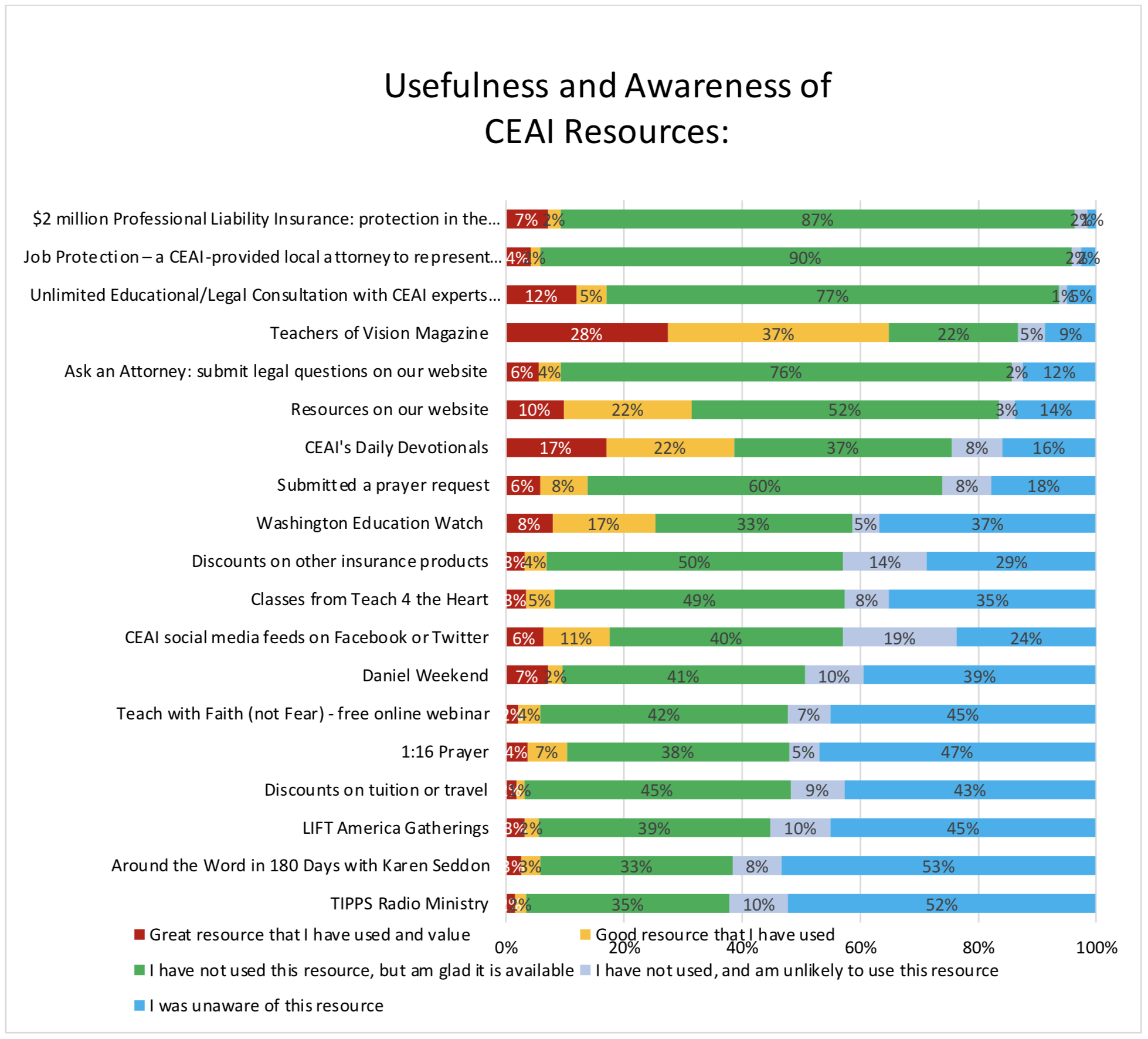2019 Member Survey
CEAI 2019 Member Survey – What You Told Us
What you think matters to us! In order to more effectively serve you and better represent you to educators, the media, political leaders, and others, we conducted this 2019 Member Survey. We hope you will be interested, enlightened, and even encouraged by the results.
The survey is organized into six sections. Click on any heading to jump to that section.
Demographic information revealing information like type of school, grade level, experience, and location.
Find out why other members are committed to teaching and how they live out their Christian calling in the workplace as well as support received (or not received) from teacher unions.
What are the major roadblocks thrown up by the culture that hinder student success, and how does school discipline practices affect students.
See how members feel about their ability to operate as Christians within the schools, and how the LGBTQ agenda is impacting fellow Christian teachers across the country and in a few different states.
What school options should be available to students and families and should they be funded by the government?
Find out what CEAI benefits your colleagues have found helpful.
There are eight important findings from this survey which you will also find among the results. They are:
Finding #1
In many ways CEAI members are very similar to other teachers. They enjoy their work, are quite dedicated to teaching well, and put in extra hours and resources as needed to ensure student learning.
However, they also share some beliefs and practices that are probably not common, particularly to non-Christian teachers:
- They believe that their teaching work is part of their Christian service
- They pray for their students regularly
- They feel that the national teacher unions do not represent their values and beliefs, and do not support union political endorsements
Finding #2
About 2/3 of CEAI members who work in the public schools feel that they understand the rules regarding how they can live out their faith at work without violating the law or the religious freedoms of their students who have a right to hold their own religious beliefs.
Finding #3
CEAI members expressed concerns regarding LGBTQ issues:
- They feel very strongly (78%) that they should not be required to affirm LGBTQ identities of students
- They are almost unanimous in their desire to treat students identifying as LGBTQ with dignity and respect
- Less than 1/3 of feel they are familiar with state and district policies regarding gender identity
- About one in five fear losing their jobs because of these policies (about one in three in California)
Finding #4
Even though 86% of CEAI members work in public schools, over 70% believe that other options including charters, vouchers and tuition tax credits should be made available to families. Just over half of those who support these options felt that vouchers and tax credits should be awarded particularly to lower and middle-income families.
2019 CEAI Member Survey – Who Are You?
Getting to know you…
Thank you so much to those who responded to our survey. We received responses from almost 1,000 members which represents about 20% of our membership.
Responses were received from 46 states and the District of Columbia and from as far away as Dubai (UAE) and Armed Forces in Japan. The most responses came from California (12% of total) and Kentucky (8% of total).
Click image to enlarge
Overwhelmingly CEAI members are teachers serving in the public schools. However, members touch upon every facet of the education process in all settings and every grade level.
We think it is important for all of us working in education to be supported and valued. We want to create structures where we can get to know each other better to support and pray for each other.
Click image to enlarge
Your Work Life
Why do you work in the schools?
We wanted to understand what makes you a tick as a teacher — why you do what you do?
- Well over 90% are serving your Christian calling though the work you do and believe that you have a strong positive impact on your students
- About 80% recommend teaching to other Christians who want to make an impact for Christ
- About 90% indicated that you receive a great deal of satisfaction from your work
Click image to enlarge
How does this compare?
The responses to the question about job satisfaction are consistent with how teachers in the U.S. feel about their work.
The responses to the question about job satisfaction are consistent with how teachers in the U.S. feel about their work. Recent international polling on the 2018 Teaching and Learning International Survey (TALIS) sponsored by the Organization for Economic Cooperation and Development also showed 90% of US teachers saying their either “agree” or “strongly agree” to the statement that, “all in all I am satisfied with my job.” However, the TALIS survey also showed that only 36% of U.S. teachers think, “the teaching profession is valued in society.” We did not ask this question of CEAI members, but their strong belief that their work is valued by the Lord may override the discouragement teachers who do not have faith find in the lack of societal support for their work.
Your ministry to students and other staff doesn’t end when you leave the school:
- Almost 80% frequently pray for your students
- 65% frequently pray for other school staff
- Over 40% frequently work with students outside of school in Christian ministries like Bible studies, clubs, community groups and church activities
Click image to enlarge
How does this compare?
While the specific hours are difficult to nail down this is comparable to the hours reported by all by U.S. teachers. According to the National Center for Education Statistics U.S. Schools and Staffing Survey in 2003-04 teachers were required to work between 35 and 40 hours per week but actually worked about 53 hours.
How does this compare?
Again, CEAI members are very similar to other U.S. teachers on this question. The National School and Staffing Survey for 2006-07 showed that 92% of teachers used their own money to support their classroom giving on average $450. About 90% of CEAI members who responded to this question reported using their own resources to support the classroom and the average amount they gave was $417.
Regarding Unions
The overwhelming majority of CEAI members do not feel represented by the NEA, AFT or affiliated state associations:
- Fewer than 5% believe that the union represents your values and beliefs
- Less than 5% support the political endorsements of the union
However, most of you (69%) know that because of the recent Janus Supreme Court decision, you cannot be compelled to join a union or support it financially.
Finding #1
In many ways CEAI members are very similar to other teachers. They enjoy their work, are quite dedicated to teaching well, and put in extra hours and resources as needed to ensure student learning. However, they also share some beliefs and practices that are probably not common, particularly to non-Christian teachers:
- They believe that their teaching work is part of their Christian service
- They pray for their students regularly
- They feel that the national teacher unions do not represent their values and beliefs, and they do not support their political endorsements
Obstacles to Student Success
Many factors outside the school that have a bearing on your students’ ability to learn. You clearly ranked the breakdown of the family as number one, with 97% showing this as at least a moderate obstacle.
Close behind were:
- Lack of civility and respect by students (96%-moderate obstacle or worse)
- Lack of character development in students (95% at least moderate obstacle)
- Lack of religious grounding in students (93% at least moderate obstacle)
- Social media (94% at least moderate obstacle)
- Technology addiction (93% at least moderate obstacle)
- Parental involvement (94% at least moderate obstacle)
In the comment section on this question we asked you if there was anything we left off the list and a number of you let us know that poverty is a major impediment for some students. We will be sure to include this as a choice if we ask you this question again.
Click image to enlarge
Student discipline also has a major impact on your students’ ability to learn. Discipline can be improved through consistent enforcement of effective policies at the school level. From your responses it seems like many schools could do better with this:
- Only 57% of you agree or strongly agree that your school enforces its discipline standards consistently and effectively
- 62% agree or strongly agree that you feel supported by your school’s discipline policies and practices
Click image to enlarge
While it may seem to be a good thing that 83% agree or strongly agree that, “I feel safe at school,” this is such an important and fundamental part of good schools that affirmative responses should be much closer to 100%. It follows that 30% have considered quitting or transferring schools because of discipline and safety issues.
Religious Liberty and LGBTQ Issues
A major purpose of CEAI is to watch over the religious liberties of you and your students.
- Regarding students:
- 71% believe that students feel free to exercise their faith
- 58% state that Christian clubs are available for your students
- Regarding teachers and staff:
- Over 65% feel confident that you understand your rights
- 85% believe you can be honest in answering student questions about your faith
- 69% feel that your administrators are tolerant of legally appropriate expression of your faith
Click image to enlarge
Finding #2
About 2/3 of CEAI members who work in the public schools feel that they understand the rules regarding how they can live out their faith at work without violating the law or the religious freedoms of their students who have a right to hold their own religious beliefs.
Truth and Grace: The sexual revolution makes it difficult for some Christians to teach in the public schools:
- 62% know students at your school who are dealing with gender dysphoria or gender identity confusion and 49% of you have had such students in your classroom
- 96% of you believe that such students should be treated with dignity and respect, only 1 member disagreed with this statement and 3% had no opinion
- 78% believe that you should not be required to affirm LGBTQ identities as a condition of employment
- However, many of you (27%) have been asked to refer to a student by a name or pronoun other than their birth gender
- Half of you are not familiar with the policies in your state or district about this matter, but 19% are afraid of losing your jobs over these policies
Click image to enlarge
Finding #3
CEAI members who work in the public schools are almost unanimous in their desire to treat LGBTQ students with dignity and respect.
At the same time these pubic school employees feel very strongly that they should not be required to affirm LGBTQ identities of students.
There is a significant lack of training about LGBTQ issues. Less than 1/3 of Christian employees feel they are familiar with state and district policies regarding gender identity.
About one in five CEAI members fear losing their jobs because of these policies.
These results lend themselves to a few observations:
- For the most part (excepting Alabama and Virginia which come in a little lower) you all seem to have similar numbers of students in your schools and classrooms with gender dysphoria or gender identity confusion
- In every state looked at, your strong feeling that all students should be treated with dignity and respect remains consistently high – over 90%
- Similarly, in these seven states there is consistent belief that that you should not be required to affirm LGBTQ identities of students
- There is consistently low (under 25%) feeling of familiarity with state or district policies pertaining to gender identity
- There is surprising variability in your fear about losing your job regarding LGBTQ issues
- California leads the way with this “fear factor” with over 30% of respondent expressing this concern
- Pennsylvania and Tennessee respondents came in with a moderate “fear factor” at around 20% which is close to the concern registered by all respondents – 19%
- The remaining four states – Alabama, Kentucky, Nebraska, and Virginia – had a relatively low “fear factors,” all coming in lower than 10%
School Choice
School choice continues to be one of the hottest topics in public education, so we asked you a series of questions about vouchers, tuition tax credits and charter schools.
We were surprised that even though so many of you (86%) work in the public schools, many of you support 71% some sort of choice.
Click image to enlarge
For those of you who support choice we asked which specific type you support:
- 72% support charter schools
- 68% support tuition tax credits for parents who homeschool or send their children to private schools
- 66% support vouchers for those families that send their children to any school charging tuition, including religious schools
- 0% — that’s right, absolutely none of you— supported vouchers only for non-religious schools
Click image to enlarge
Finding #4
Even though 86% of CEAI members work in public schools, over 70% believe that other options including charters, vouchers and tuition tax credits should be made available to families. Just over half of those who support these options felt that vouchers and tax credits should be awarded particularly to lower- and middle-income families.
The CEAI Member Survey is based on 952 responses of CEAI Members with Coverage from March 24 – May 12, 2019.

